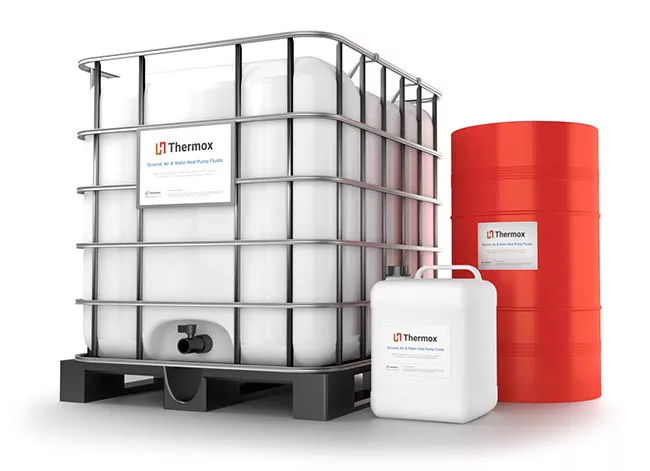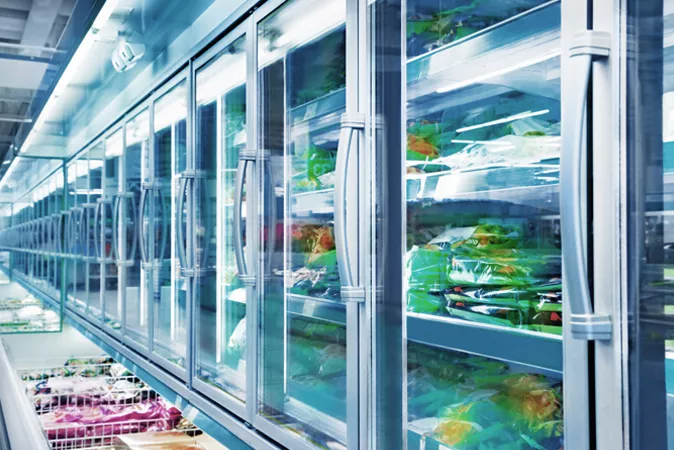Thermox™ Fluids
A range of low temperature rated heat transfer fluids with antifreeze function, for use in geothermal, ground source heat pump and air-source heat pump recovery systems, both commercial and domestic.
More about Thermox™Propylene glycol (PG) and salt based HTF’s are widely used across the heat pump sector, but both have their drawbacks. Ethylene glycol (MEG - widely used in car coolant systems) is also considered and has the best heat transfer rates of all glycols, but its toxicity to humans and animals presents a significant risk in the event of a leak pre/post commissioning.
Thermox DTX™ is a high efficiency, non-toxic geothermal heat transfer fluid with antifreeze function, for use in geothermal, GSHP & air source heat recovery systems. The innovative fluid from Hydratech is based on ethylene glycol, blended with a patented DeTox™ additive. Long-life inhibitors provide protection against to internal corrosion, scaling and biological fouling.
Industry proven to maximise heat recovery, reduce maintenance and lower running costs, Thermox DTX™ is specified by the UK’s largest heat pump contractors, installers and designers. It has been commissioned in thousands of commercial and domestic heat pump systems by industry leaders such as Kensa, Nu-Heat and Ideal.
Low Carbon Farming’s mega-greenhouse project in Norfolk and Suffolk, a world-first for renewable heating utilises Thermox DTX™ - where heat is extracted from the local water treatment works and transferred in a closed loop system, to the heat pumps located at the greenhouses. The project, capable of producing 12% of the UK’s tomatoes with a 75% reduction in carbon footprint, demonstrate how renewable heating systems, and heat pumps in particular can be deployed at a commercial scale.
Thermox DTX™ is a major step forward in heat transfer for geothermal, GSHP and air-source heat recovery systems, both commercial and domestic. Here are some of the key reasons why the likes of Kensa and Low Carbon Farming specify it in their systems.
Over 10% improvement in COP, ROI and heat recovery rate
Due to lower viscosity, higher thermal conductivity and reduced volume required to achieve the same freeze-protection.
Less volume required for every installation 5% less volume for -15C freeze protection - which improves COP and reduces cost.
Lower COD and BOD compared with PG
More readily biodegradable than PG based heat transfer fluids (HTF).
Same low toxicity as PG Thermox DTX™ is verified and documented as non-toxic. In 2012 Cowi A/S and Mediator A/S in Denmark performed due diligence on Thermox DTX™ on behalf of the Danish EA, for the purposes of specifying Thermox DTX™ for use in geothermal systems in Denmark. Based on the findings of those two companies the Danish EA confirmed that Thermox DTX™, but not standard MEG based HTF, could be used.
Lower contamination risk
Greater natural resistance to biological fouling in geothermal and other heat transfer systems.
Far less corrosion Salt based brine HTF’s are exceptionally corrosive in the presence of oxygen, no matter the inhibitor formulation. With the best of intentions, geothermal systems have proven over the last 25 years to be very difficult to keep 100% tight and leak free. Thermox DTX™ is far less corrosive than all potassium formate solutions, when in the presence of oxygen (dissolved or otherwise).
Less leakage
Potassium Formate based heat transfer fluids are exceptionally ‘searching’ – with low cohesive properties and small molecules - known to find even the smallest of openings. Especially those around pump seals (mechanical and gland type), compression joints and manifold connections.
Protects components
The high specific gravity of potassium formate based HTF (>1.3) is beneficial for specific heat purposes. But at high flow-rates is known to have a scouring effect on the surface of carbon-steel components, which can lead to accelerated corrosion. This characteristic is not identified during the standard ASTM D1384 corrosion test, as the sample used is static (no flow).
Easier to biodegrade
Whilst the BOD and COD of formate based solutions are lower than glycol based solutions, including Thermox DTX™, biodegradability tests (COD/BOD5 ratio) show that formates are harder to biodegrade than acetates and glycols, due to the presence of organic matter which is biodegradation resistant, and mineral matter.

A range of low temperature rated heat transfer fluids with antifreeze function, for use in geothermal, ground source heat pump and air-source heat pump recovery systems, both commercial and domestic.
More about Thermox™


Regular analysis can extend the life of both fluid and system. Hydratech’s Fluid Monitoring Program (FMP) is a very straight forward, effective way to proactively monitor closed-loop system condition.

A range of low temperature rated heat transfer fluids with antifreeze function, for use in geothermal, ground source heat pump and air-source heat pump recovery systems, both commercial and domestic.
More about Thermox


If you need help or advice on selecting the most suitable product for your needs call one of our sales engineers today. With experience across many industry sectors we can help you find the most cost effective solution whilst meeting all your technical requirements.
Call today on 01792 586800
Sorry, we need you to complete all the required fields before we can process your enquiry.
Regular analysis can extend the life of both fluid and system. Hydratech’s Fluid Monitoring Program (FMP) is a very straight forward, effective way to proactively monitor closed-loop system condition.